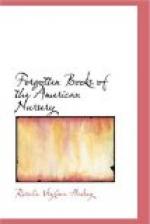The war, however, was not allowed to interfere with the children’s education in this family. In company with other little exiles, they were taught by a venerable old man until the evacuation of Philadelphia made it possible to send the older children to Germantown, where a Mr. Leslie had what was considered a fine school. The schoolroom walls were hung with lists of texts of Scripture beginning with the same letter, and for globes were substituted the schoolmaster’s snuffbox and balls of yarn. If these failed to impress a child with the correct notions concerning the solar system, the children themselves were made to whirl around the teacher.
In Basking Ridge the children had much excitement with the passing of soldiers to Washington’s headquarters in Morristown, and with watching for “The Post” who carried the news between Philadelphia, Princeton, and Morristown. “‘The Post,’ Mr. Martin,” wrote Mrs. Quincy, “was an old man who carried the mail, ... he was our constant medium of communication; and always stopped at our house to refresh himself and horse, tell the news, and bring packets. He used to wear a blue coat with yellow buttons, a scarlet waistcoat, leathern small-clothes, blue yarn stockings, and a red wig and cocked hat, which gave him a sort of military appearance. He usually traveled in a sulky, but sometimes in a chaise, or on horseback.... Mr. Martin also contrived to employ himself in knitting coarse yarn stockings while driving or rather jogging along the road, or when seated on his saddle-bags on horseback. He certainly did not ride post, according to the present [1821] meaning of that term.”
Deprived like many other children of Newbery’s peaceful biographies and stories, the little Mortons’ lives were too full of an intense daily interest to feel the lack of new literature of this sort. Tales of the campaigns told in letters to friends and neighbors were reechoed in the ballads and songs that formed part of the literary warfare waged by Whig or Loyal partisans. Children of to-day sing so zestfully the popular tunes of the moment, that it requires very little imagination to picture the schoolboy of Revolutionary days shouting lustily verses from “The Battle of the Kegs,” and other rhymed stories of military incidents. Such a ballad was “A Song for the Red Coats,” written after the successful campaign against Burgoyne, and beginning:
“Come unto me, ye heroes,
Whose hearts are true and
bold,
Who value more your honor,
Than others do their gold!
Give ear unto my story,
And I the truth will tell,
Concerning many a soldier,
Who for his country fell.”
Children, it has been said, are good haters. To the patriot boy and girl, the opportunity to execrate Benedict Arnold was found in these lines of a patriotic “ditty” concerning the fate of Major Andre:
“When he was executed
He looked both meek and mild;
He looked upon the people,
And pleasantly he smiled.
It moved each eye to pity,
Caused every heart to bleed;
And every one wished him released—
And Arnold in his stead."[98-A]




